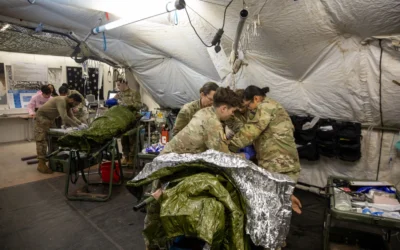In contrast to the civilian population, certain indicators of socioeconomic status, such as education, occupation, household income and neighborhood socioeconomic status, aren’t significantly linked to major cardiovascular disease events in postmenopausal women veterans, according to a recent study.
Deputy VA Secretary Nominees Faces Hard Questions on Firings
At his confirmation hearing, President Donald Trump’s nominee for deputy VA secretary, Paul Lawrence, PhD, promised he would look into recent firings at VA
A Quarter of U.S. Veterans Older Than 60 Have Been Diagnosed with CVD
One in 4 U.S. veterans age 60 and older have reported being diagnosed with cardiovascular disease at some point, which has potential implications for their physical and mental health, according to a recent study.
Critics: Some of the $2 Billion in Contracts VA Cut Were Essential for Veteran Care
VA Secretary Doug Collins announced in a video in late February that VA had cut $2 billion in cuts to contracts thus far. While he said the funds would be redirected to veterans’ health care and benefits, critics claimed the cuts will do the opposite.
More than 1,000 Firings at VA Are Just the Beginning of ‘Generational Change’
President Donald Trump began his second term with a flurry of executive orders that have resulted in the firing of thousands of employees, including many at VA, with the promise of deeper cuts to come.
VA Study Underscores the Urgent Need for Clear Guidelines on Treating Chronic Pain
A new VA-led study underscored the urgent need for clear guidelines on how best to treat chronic pain, especially when it comes to prescribing opioid pain medications.
SGLT2i Use Linked to Higher Risk of Amputations in Diabetes Patients
More than 30 million U.S. adults—including approximately 25% of veterans—have diabetes, putting them at increased risk of heart disease.
Legislators Push for Better Oversight of VA Community Care Providers
As promised, the new Republican-led Congress began the legislative year by focusing heavily on community care in VA, with a glut of hearings targeting different aspects of the issue.
VA Experts Push for Consistency, Innovation in Bladder Cancer Care
Bladder cancer, recently designated as a presumptive condition for Gulf War and Post-9/11 veterans, per the PACT Act, is the third most prevalent noncutaneous cancer among veterans, following prostate and lung cancer.
Impulse Oscillometry Not Recommended for First-Line Airway Obstruction Evaluation After Deployment
When evaluating airway obstruction in military personnel after deployment, impulse oscillometry (IOS) may serve as an additional diagnosis tool, but it can’t replace the reliability of the standard spirometric evaluation, according to a recent study.
Rural Veterans Have Less Access to Crucial COPD Therapies Post-Discharge
Chronic obstructive pulmonary disease, a group of progressive and complex conditions that affect the lungs, require a comprehensive treatment approach.
Oral, Intravenous Antibiotics, Both Effective in Treating Fracture-Related Infection
Both oral and intravenous antibiotics are effective after fracture-related infection (FRI), a serious complication following fracture fixation surgery, according to a recent study.
GOP Legislators Push Bill to Expedite Firing Authority for VA Employees
Republican legislators are again seeking to provide the VA secretary with expedited firing authority for VA employees that are deemed “bad actors.”
Martin Focuses on Improving Sleep-Disorder Treatment for Veterans
We spend approximately one-third of our lives asleep, but it’s only been in the last couple of decades that the medical community has begun to understand in detail just how important sleep can be to our lives.
Issues Weren’t That Different in VA 60 Years Ago
With news every day about VA staffing cuts, the cancellation of contracts and, essentially, the way the agency does business, it is interesting to look back to what might seem to us as a simpler time – 60 years ago, when U.S. Medicine began.
A Range of Factors Put Veterans at Higher Colorectal Cancer Risk
Colorectal cancer (CRC) remains a major health threat in the United States, ranking as the fourth most common cancer among men and women combined.
VA Offers Pathway through First-Line Treatment Options for mCRC
The VA diagnoses approximately 4,000 new CRC cases annually. More than half of people with CRC either have metastatic disease at diagnosis or will develop it
The Importance of Hyperselection in Treating Metastatic CRC
Recent research in metastatic colorectal cancer (mCRC) demonstrates that personalized therapy outperforms broad approaches to treatment of this challenging malignancy in federal medicine and elsewhere.
Staying Ahead of EFGR Dermatological Toxicities in CRC
Epidermal growth factor receptor (EGFR) inhibitors such as panitumumab are pivotal in treating metastatic colorectal cancer (mCRC) patients with wild-type KRAS mutations in the first, second and third lines, especially in patients with wild-type RAS genes.
New Treatment Options Extend Survival for Veterans with DLBCL
Diffuse large B-cell lymphoma (DLBCL) is the most prevalent subtype of non-Hodgkin lymphoma (NHL), characterized by its aggressive nature.
Exposures Increase DLBCL Risks for Veterans, Servicemembers
Exposure to a wide range of chemicals and radiation has long been known to increase the risk of developing diffuse large B-cell lymphoma (DLBCL).
Survival Improving for Most Common Lymphoma Diagnosed in Veterans
Diffuse large B-cell lymphoma (DLBCL) is the most common type of lymphoma diagnosed in active-duty servicemembers and veterans. Fortunately, advances in understanding of the disease are leading to more targeted and effective therapies and improved survival rates.
‘Tip of the Spear’
Throughout my military career, I would hear the phrase ‘tip of the spear’ to describe units or leaders who were first to the fight. The metaphor refers to the business end of one of the oldest weapons of warfare, the spear. As Madeline Miller in “The Song of Achilles” says, “You can use a spear as a walking stick, but that will not change its nature.” Everyone understands what the spear represents and what it is for. As military medical physicians, we often discuss our role as the “soft side of the spear.” We were not at the pointy end, but we certainly supported the effective implementation and application of force embodied by the spear tip.
VA Urged to Avoid Large Monolithic IT Projects, Use a More Modular Approach
Legislators, agency watchdogs and VA leaders are in agreement: The department must stop investing in massive, multiyear IT projects whose intention is to solve a technology need in one fell swoop.
VA EHR Rollout Will Resume in 2026 at Several Michigan Sites
VA has announced that it is planning to restart the rollout of its electronic healthcare record modernization project in mid-2026, starting with four facilities in Michigan—Ann Arbor, Detroit, Battle Creek and Saginaw.
Chemoprophylaxis Is Likely Safe if Started 72 Hours After TBI, but Evidence Lacking for Earlier Use
Prophylaxis for venous thromboembolism (VTE) is crucial in people who have had traumatic brain injuries (TBIs), due to their heightened risk caused by immobility, inflammation and coagulation system activation.
Opioid-Use Disorder Prevalence Declined Since 2017, Especially in Black, Hispanic and Younger Veterans
After peaking at 1.16% in 2017, the prevalence of opioid-use disorder (OUD) among VHA patients declined steadily and was 0.97% in 2022, the most recent date for which data is available.
Soft-Tissue Sarcoma Rates Higher in Middle-Aged Servicemembers
While the incidence rates of soft-tissue sarcomas are lower in young U.S. active-duty military servicemen compared with those in the general population, according to a new study, those are higher in middle-aged servicemen, possibly because of greater cumulative exposure to toxins.
Large Analysis of Veterans With Diabetes: More Benefits with GLP-1RA, Especially Neurological
While glucagon-like peptide-1 receptor agonists (GLP-1RA) are known to successfully treat diabetes and aid weight loss, they also have other widespread benefits, including for cognitive and behavioral health.
Vascular Comorbidities Affect Functionality in Multiple Sclerosis Patients
Do multiple sclerosis patients with a vascular comorbidity such as hypertension, hyperlipidemia, heart disease and diabetes have more issues with functional activities, and how does that relate to disability, depression and fatigue?






